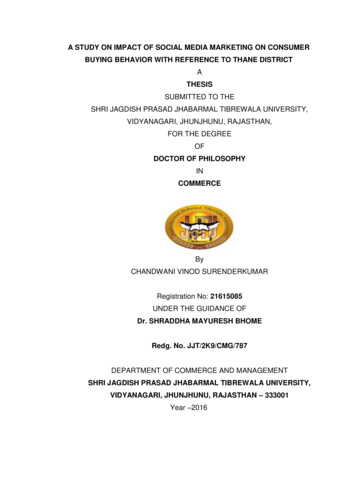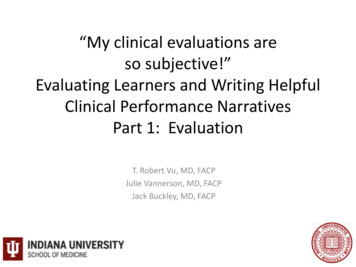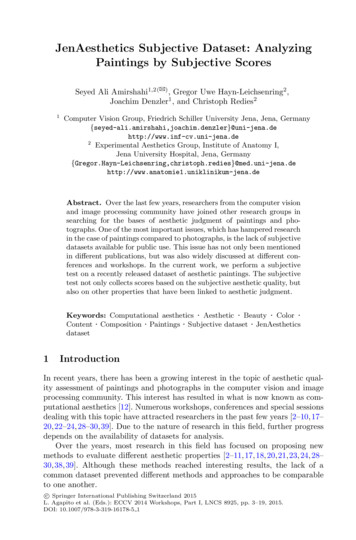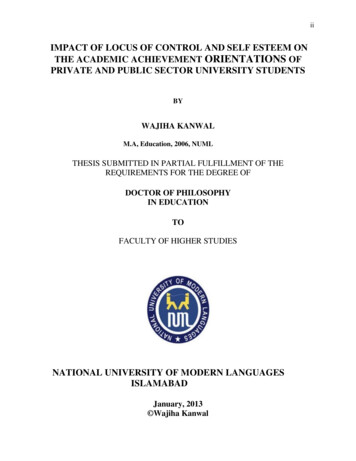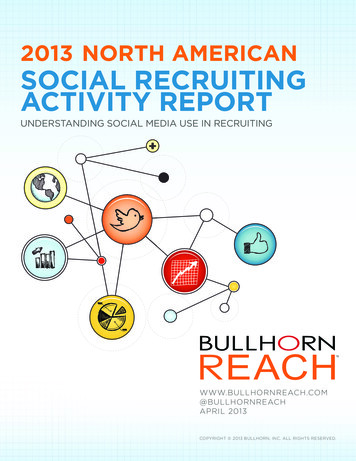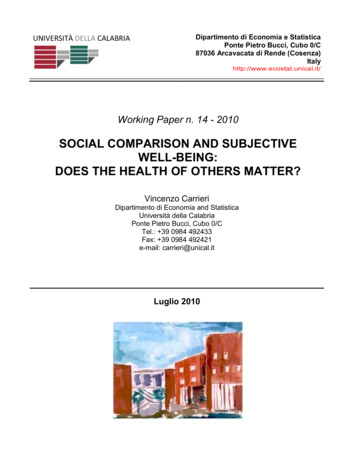
Transcription
UNIVERSITÀ DELLA CALABRIADipartimento di Economia e StatisticaPonte Pietro Bucci, Cubo 0/C87036 Arcavacata di Rende (Cosenza)Italyhttp://www.ecostat.unical.it/Working Paper n. 14 - 2010SOCIAL COMPARISON AND SUBJECTIVEWELL-BEING:DOES THE HEALTH OF OTHERS MATTER?Vincenzo CarrieriDipartimento di Economia and StatisticaUniversità della CalabriaPonte Pietro Bucci, Cubo 0/CTel.: 39 0984 492433Fax: 39 0984 492421e-mail: carrieri@unical.itLuglio 2010
Social Comparison And Subjective Well-beingSocial comparison and subjective well-being:Does the health of others matter?(†)Vincenzo Carrieri (*)Department of Economics and StatisticsUniversity of CalabriaAbstractThe importance of social comparison in shaping individual utility has beenwidely documented by subjective well-being literature. So far, income hasbeen the main dimension considered in social comparison. This paper aimsto investigate whether subjective well-being is influenced by inter-personalcomparison with respect to health. Thus, we study the effects of the healthof others and relative health hypothesis on two measures of subjective wellbeing: happiness and subjective health. Using data from the Italian HealthConditions survey, we show that a high incidence of chronic conditions anddisability among reference groups negatively affects both happiness andsubjective health. Such effects are stronger among people in the sameconditions. These results, robust to different econometric specifications andestimation techniques, suggest the presence of some sympathy in individualpreferences with respect to health and reveal that other people‟s healthstatus serves as a benchmark to assess one‟s own health conditions.JEL classification: C21; D64; I31Keywords: health conditions; social comparison; subjective well-being.(†) I wish to thank Maria De Paola for her comments, ideas and suggestions on a preliminary version of thispaper. Thanks are also due to Elena Granaglia, Leandro Elia and Paolo Trevisan for their comments. The usualdisclaimers apply.(*)Address: Department of Economics and Statistics, Ponte Bucci, Cubo 0/C, University of Calabria, 87036Arcavacata di rende (CS). Tel (39) 0984-492433. E-mail: carrieri@unical.it
Social Comparison And Subjective Well-beingI. INTRODUCTIONInvestigating the determinants of individual well-being is becoming a popular task among empiricaleconomists. Research on this topic has become even more popular in recent years, thanks to theavailability of surveys on self-rated happiness and life satisfaction for many countries.However, measuring utility poses a number of relevant problems. Some scholars haveshowed that self-rated happiness scores are not completely reliable, as they can be influenced bycontingent circumstances and recall bias due to the temporal sequence of relevant events. Othersargue that happiness scores are subject to important cultural biases among countries (Ostroot andSnyder, 1985) 1. Despite these difficulties, research on subjective well-being is important for manyreasons, especially on normative grounds. Measuring happiness permits, for instance, the evaluationof the welfare net effects of policies which imply some kind of trade-off (ie inflation vsunemployment) (Frey and Stutzer, 2002); it allows the estimation of the effects on utility ofinstitutional aspects, such as public governance (Helliwell 2003) or the estimation of the value thatpeople assign to non-marketable goods, such as health or environment (Ferrer-i-Carbonell and vanPraag, 2002; Clark and Oswald, 2002; De Mello and Tiongson, 2009). In addition, investigating thedeterminants of subjective well-being can help “to shed new light on basic concepts andassumptions of economic theory” (Frey and Stutzer, 2002, p. 403).Leaving aside many important contributions by other research communities (mainlyphilosophers, psychologist and sociologist) the main interest of economists on this topic has beenthe investigation of the role of income on happiness. Standard neo-classical theory suggests, in fact,that income positively affects utility, allowing individuals to buy consumption and investmentgoods. The empirical research has provided support to this assumption showing that income plays acrucial role in defining individual well-being.More recently, with the intention to interpret the well-known Easterlin paradox (1974), wellbeing literature has shown that relative income, more than absolute income, drives happiness.People get utility not only by objective conditions (i.e. higher income) but also by socialcomparison. In other words, it is not income per se that matters for utility but rather the position aperson has in society.In the same period, similar conclusions have been reached by other research communities(mainly epidemiologists and sociologists) focused on understanding health inequalities among1We recall just a few of the methodological criticisms on happiness scores. A detailed elaboration of this critique ispresented in Kahneman et al. (1999).
Social Comparison And Subjective Well-beingdifferent social groups. This research stream has highlighted that relative income contributes to theenhancement of both subjective and objective health conditions by reducing health-damagingfactors such as stress and social isolation and by increasing health-promoting factors such as a gooddiet and physical exercise.In summary, these two research streams suggest that inter-personal comparison stronglyinfluences the subjective assessment of happiness and health, but so far, income has been the onlydimension considered in social comparison.This paper analyses the role of interpersonal comparison with respect to health on happinessand subjective health using data from the Italian Health Conditions survey 2004-2005 (Condizionidi salute e ricorso ai servizi sanitari) . Our approach follows the idea that happiness and healthpresent a lot of structural analogies, being two related dimensions of human well-being. Unlikemost literature focused on the influence of income in social comparison, we consider the role ofhealth as a dimension of social comparison. A social comparison with respect to health is to beexpected being that health is the main determinant of individual well-being, probably much morethan income (Ferrer-i-Carbonell and van Praag, 2002; Clark and Oswald, 2002; De Mello andTiongson ,2009; Frey and Stutzer, 2002). Furthermore, some interest in the health of others mayrely on two grounds. First, individuals might care about others‟ health status, because of altruism orsympathy2. Second, other‟s health status may matter for individuals as a benchmark to assess theirown health conditions. This hypothesis is part of the debate around the reliability of subjectivehealth as a proxy of objective health (see Sen, 2002 or Bago d‟Uva et al. 2008, for a discussion)Controlling for various conventional determinants of subjective well-being and using astandard reference group identification criteria, we find that a high incidence of chronic anddisability conditions in the reference group affects negatively both happiness and subjective healthand that this effect is stronger among people with similar health conditions. These results are robustto different econometric specifications and estimation techniques. In addition, despite somepeculiarities, our results are valid even across people with a likely different cultural background(living in the North vs the South of the country).2The difference between these two concepts relies on the validity of the hypothesis of selfish individuals. According toSen‟s sympathy concept (1977), the presence of some interest on the well-being of others could be explained evenwithout relaxing the hypothesis of self-interested individuals. As Sen (op cit. p. 95) states “behaviour based onsympathy is in an important sense egoistic for one is one-self pleased at others‟ pleasure and pained at others‟ pain andthe pursuit of one‟s own utility may thus be helped by sympathetic action” . Sympathy can be viewed, then in terms ofexternalities. The importance of this concept in health care has been highlighted by Culyer (1976).
Social Comparison And Subjective Well-beingThe rest of the paper is organized as follows. Section two briefly summarizes literature on theimportance of social comparison for subjective well-being. Section three presents the data. Sectionfour sketches out the empirical model and describes the variables used in the analysis, along withsome descriptive statistics. Section five presents and discusses the results along with somerobustness checks. The last section summarizes and concludes.II. SOCIAL COMPARISON AND SUBJECTIVE WELL-BEINGAfter the Easterlin (1974) seminal paper, subjective-well being research has been deeply concernedabout the influence of social comparison in shaping individual utility. By showing the flat level ofhappiness in the last 100 years even in the presence of a strong increase in absolute income,Easterlin‟s paper (1974) has been a cornerstone for happiness research for two reasons. On the onehand, it suggests that income plays a minor role in happiness once an individual rises above apoverty line or „subsistence level‟, while on the other hand, it implies that happiness dependsstrongly on relative status.To put it formally, what seems to matter for happiness is individual income compared to theincome of a “reference group”:(1)whereis individual income at timeandis the income of individual i’s “reference group” attime . Theoretical literature has suggested two definitions of reference income group, both internal(past individual income) and external (where comparisons refer to distinct demographic groups suchas one‟s own family, other workers at the individual‟s place of employment, people in the sameneighbourhood, region, country, or even people across a whole set of countries). Both definitionshave lead to the same result, namely, that income cannot buy happiness per se, but relative incomecan (Clark et al., 2007; Heady, 1991; Diener, et. al., 1993; Frey and Stutzer, 2000; Easterlin, 2001;Van Praag and Ferrer-i-Carbonell, 2004).Many scholars from various research communities (mainly epidemiologists and sociologists)investigating the social determinants of health have reached similar conclusions, that is, socialcomparison does matter. The bulk of literature found that, in richer countries, relative income is thefirst predictor of health (both subjective and objective), even greater than any other individual riskfactor (Marmot and Wilkinson, 2006). People in lower relative status, in fact, are likely to beexposed to behavioural risks (such as smoking, low exercise, diet) and to psychosocial risks such asstress and social isolation that are health damaging, both on mental and physical grounds
Social Comparison And Subjective Well-being(Kakwachi et al, 1997, Kakwachi and Kennedy, 1997, Wilkinson, 1996; Hsieh e Pugh, 1993). Suchfactors also accumulate together, showing a high intergenerational persistence (Power et al. 1998).Therefore, happiness and subjective health research seems to support the idea that socialcomparison is a key factor for subjective well-being. So far, income has been the main dimensionconsidered. In this work we argue that this view is too restrictive because inter-personal comparisonis likely to be performed even with respect to other dimensions of well-being. Health status isprobably one of these for three reasons.Firstly, health is the most important determinant of individual well-being. Clark and Oswald(2002), for instance, show that the largest valuation in happiness comes from health status, and anindividual whose „„health declines from excellent to good would require a payment of tens ofthousands of pounds per month in order for the happiness score to remain unchanged‟‟. Frey andStutzer (2002, p.56) remark that “when people are asked to evaluate the importance of various areasof their lives, good health obtains the higher rating”. Ferrer-i-Carbonell and van Praag, (2002) andDe Mello and Tiogson (2009) reach similar results. In addition, health conditions strongly correlatewith other dimensions of well-being such as job satisfaction (Sales and House, 1971; Wall et al.,1978).Secondly, one might be interested in the health of others both on altruism and sympathygrounds. People might care about the health of others because they are not selfish or becausestaying with people in good health increases their individual utility. As Culyer (1976) suggests,others‟ illness influences well-being, not only because of the risk to be infected, but because mostpeople care.Finally, other‟s health status might serve as a benchmark to assess one‟s own healthconditions. Indeed, self-assessment of health status is influenced by the expectations for one‟s ownhealth, that is likely to be based on the health conditions of some reference group. This idea is alsopart of the debate around the reliability of subjective health as a proxy of objective health (see Sen,2002 or Bago d‟Uva et al., 2008 for a discussion).Hence, we believe that the role of health as a dimension of social comparison should be furtherinvestigated. Such analysis is generally absent in subjective well-being literature and even studieson altruism and happiness lack an explicit health dimension (see Schwarze and Winkelmann, 2005,for a discussion). 3 This paper will try to fill this gap by exploring how health conditions of otherpeople affect individual happiness and subjective health.3De Mello and Tiongson (2009) are a noteworthy exception given that they explore the effect of family‟s health onindividual happiness suggesting the presence of altruism in individual preferences. They don‟t consider, anyway,relative health effects and they do explore family‟s health rather than health of a reference group. This casts somedoubts about the fact that a positive sign of family‟s health coefficient on happiness can be interpreted only on altruism
Social Comparison And Subjective Well-beingIII. DATAWe use data from the last wave (2004/2005) of the Italian Health Conditions survey (ISTATCondizioni di Salute e Ricorso ai Servizi Sanitari). The survey is conducted every 5 years on anationally representative sample of 128,040 individuals and 50,474 households. Happiness scoresare collected only for people aged more than 13 years old, then the analysis is carried out on asample of 111,151 and 128,040 individuals for happiness and subjective health, respectively. Thesurvey gathers information on health conditions, disabilities, life-styles, prevention and health-careuse as well as information on individual and household socioeconomic conditions. Furthermore,despite the survey lack of a longitudinal dimension, it contains information on happiness andobjective and subjective health, which renders this data-set particularly suitable to our researchfocus4.IV. EMPIRICAL MODEL AND VARIABLES DESCRIPTIONWe estimate the following empirical model of subjective well-being ():(2)Wherereference group (is individual health at time ,at timeandis individual health compared to the health ofis a vector of other explanatory variables. We estimate (2)using two measures of subjective well-being: subjective health and happiness.Subjective health is measured according to the standard question: “How do you rate yourhealth?” with five conventional answers “Very Good, Good, Fair, Bad, Very Bad”. Happiness ismeasured according to the following question and answer on a six-point scale : “All together, howmany times did you feel happy in the last four weeks? Always, Almost Always, Many times,Sometimes, Almost Never, Never”.We have information on 24 chronic conditions and several disability conditions grouped in 4areas (Blindness and visual impairments, Deaf Mutism, mobility or orthopedic impairments, mentalillness or emotional disturbance). All these conditions are self-reported but diagnosed by aphysician; this should ensure that we refer to objective health conditions. Individual health isground or even on sympathy ground. A family member with bad health conditions requires care from the other familymembers and eventually to afford monetary costs to buy medical care. This directly entails individual well-being.4Other surveys containing a longitudinal dimension and useful for a cross-country comparison (European SocialSurvey and The European Community Household Panel) lack these variables.
Social Comparison And Subjective Well-beingmeasured, then, through a dummy variable equal to one if an individual suffers from one or morechronic or disability conditions and zero otherwise. We use two measures to define Health ofothers. First, along with De Mello and Tiongson (2009), we refer to family health. One question inthe data-set explicitly asks if one household member had suffered or suffers from a severe illness;we build a dummy equal to one in this case and equal to zero otherwise. As a second measure of theHealth of others, we use the proportion of persons that suffer from chronic and disability conditionsamong the individual reference group. Reference group of individual i is identified by the peoplewho are 5 years older or younger than i, living in the same region, having attained a similar level ofeducation (one degree above or below ISCED category than individual i), are in the same socioprofessional status (unemployed, retired, etc.) and live in the same area (rural/urban). This referencegroup identification is quite common in happiness literature (see Ferrer-I-Carbonell, 2005 andMcbride, 2001). The living area variable is probably less common, but we prefer to use it given thatgenerally health profiles are very different among people living in rural and urban areas. Then, theeffect of Relative health is measured by the interaction between individual health and the proportionof people suffering from chronic diseases or disabilities in the reference group.Vectorcontains the following variables: individual socio-professional status(unemployed, employed, housekeeper, unable to work, retired, other categories), housing conditions(problems with light, humidity, heating), living area (urban/rural), marital status (single, married,divorced, separated, widow), sex, education (5 ISCED levels), a polynomial specification of ageand some measures of relational goods and social capital (namely, the feeling of presence/nopresence of relatives, friends, neighbours and volunteer organization in case of any personal need).It is noteworthy to observe that the variables used to identify the reference group of individual i(age, education, socio-professional status and living area) are all included in the regressors set. Thisshould ensure that the coefficientin equation (2) is not contaminated by the variables chosen toidentify the groups.Unfortunately the data-set we use does not contain information on income but it providesinformation with self-evaluation of family economic resources on a four point scale: optimumcircumstances, fair, insufficient, absolutely insufficient. We use four dummies to measure it.In the subjective health equation we also add some variables of health care use, such as having hada medical visit in the last four weeks and the days of hospitalization in the last three months. Theunderlying hypothesis is that health care consumption can increase health status but it does notgenerate utility per se. Summary statistics and a description of all variables are presented in Table1A (Appendix). In the case of qualitative variables, the first category presented is always the onechosen as a reference in the model.
Social Comparison And Subjective Well-beingWe estimate equation (2) using both an OLS and ordered probit estimator. Both regressions arerun correcting covariance-matrix for intra-reference group correlation, in order to avoid the socalled “Moulton problem” (Moulton, 1986). In section 4.1 and 4.2 some other empiricalspecifications are used, in order to check the robustness of our results.V. RESULTSEstimates of equation (2) for happiness and subjective health are presented in Table 2and table 2A(Appendix) 5. Qualitatively, OLS and ordered probit estimations lead to similar results both withrespect to signs and statistical significance.Before discussing the main variable of interest, we briefly have a look at the other explanatoryvariables. The results we found are pretty standard in the empirical literature of subjective wellbeing, but what is interesting is that happiness and subjective health seems to depend on verysimilar factors. Indeed, we find that objective health, economic circumstances, education,employment status, social capital and housing conditions are positive determinants of bothhappiness and subjective health. A positive effect of education on happiness has been found also byEasterlin (2005) while with respect to subjective health, our results are coherent with Furnèe et al.(2008). The effect of employment on happiness is in line with other papers (Clark and Oswald,1994; Darity and Goldsmith, 1996; Frey and Stutzer, 2002). Concerning relational goods, a positiveeffect on happiness has been found by Bruni and Stanca (2008), while a positive role of relationalgoods and social capital on health has been found by Joshi et al. (2000), Kakwachi et al. (1997),Kakwachi and Kennedy (1997), Wilkinson (1996). Regarding studies on Italian data, the effects ofeconomic circumstances, education, employment status and social capital on happiness that wefound are coherent with Scoppa and Ponzo (2008). Finally, we find that happiness and subjectivehealth are higher among males and have a non-linear relation with respect to age (the non linearrelation between happiness and age has been found also by Blanchflower and Oswald, 2007). As anon-standard result, we find that subjective well-being is negatively influenced by housingproblems. The relation between housing problems and health is well-documented in literature (seeJoshi et al., 2000), while the effect on happiness is novel. Once again, this finding supports the ideathat happiness and subjective health determinants are strongly comparable.5We show the results based on 104,342 and 109,129 individuals for happiness and subjective health analysis,respectively. The figures are slightly different to the ones shown in section 2, because we retain only the referencegroups comprised of at least 10 individuals. We end-up, then, with 464 reference groups with an average of 269 peersfor each group. This choice relies on the belief that a reference group with very few individuals turns out to beinappropriate for the social comparison process we have in mind. Anyway, we did not notice any important differencewhen estimating the model including all the reference groups.
Social Comparison And Subjective Well-beingWith respect to the key variable of our paper, we find (Table 2) that health strongly matters forsocial comparison. We find that as the health of the reference group decreases (a higher proportionof chronic and disabled individuals) both happiness and subjective health decreases. The sameoccurs with respect to the health of family members which is also a positive determinant of bothhappiness and subjective health. This last result is in line with De Mello and Tiongson (2009)while, to the best of our knowledge, there are no previous papers that have investigated the relationbetween the health of the reference group and subjective well-being. Furthermore, we find that theeffect of the health of the reference group is stronger among people in bad health conditions. Thisresult occurs both with respect to happiness and subjective health. It seems, then, that bothbenchmark and sympathy hypotheses are confirmed. People seem to use others‟ health status as abenchmark to assess one‟s own health conditions and because they care about others‟ health status.In particular, the sympathy hypothesis seems to hold with respect to happiness results given thatpeople in bad health may have more consideration towards persons with similar conditions.Table 2. Estimates results (Main covariates)- Health of reference group and relative health hypothesisMain CovariatesProportion of sick(1)(2)(3)(4)HappinessHappinessSubjective healthSubjective healthOLSOrdered ProbitOLSOrdered 129109129in the reference groupSick*proportion of sickin the reference groupNAsjusted R2Log-LikelihoodChi-Square 106223.230249.1t- statistics in parentheses. Standard errors are clustered on 464 reference groups * p .10, ** p .05, *** p 0.01
Social Comparison And Subjective Well-being1. Robustness CheckIn this section, we deal with one issue that might weaken the casual relationship we found betweenthe health of the reference group and subjective well-being. Indeed, it can be argued that thisrelationship might arise because we do not consider the effect of the income of the reference groupin our regressions. Empirical evidence, in fact, shows that people in better economic circumstancesare even in better health (see Van Doorslaer and Koolman 2004, among others). An effect of theincome of the reference group on subjective well-being, then, could bias the coefficientofequation (2).To work-out such troubles, we re-run equation (2), adding as covariates, a measure of theproportion of people reporting to be in optimum economic circumstances in the reference group.Estimate results of such estimates are presented in Table 3 (All covariates are presented in Table 3Ain appendix).In these new estimates, both the coefficients of health of the reference group and relativehealth are still significant at 1%. In OLS estimates the effect is smaller in magnitude. This meansthat a small part of the effect of the reference group‟s health is due to an income effect, but healthper se has a very significant effect on subjective well-being.As for the income of the reference group, we find a slightly significant effect only onsubjective health (10% of significance). In any case, we would advise not to rely too strongly onthis coefficient, since a subjective evaluation of economic circumstances and endogeneity problemsmay lead to biased estimates. For our concerns, what is important is that controlling for the incomeof the reference group does not change our main results.
Social Comparison And Subjective Well-beingTable 3. Robustness check (Main Covariates)Main CovariatesProportion of rich(1)(2)(3)(4)HappinessHappinessSubjective healthSubjective healthOLSOrdered ProbitOLSOrdered 129109129in the reference groupProportion of sickin the reference groupSick*proportion of sickin the reference groupNAsjusted R2Log-Likelihood0.167-164371.8Chi-Square 6t- statistics in parentheses. Standard errors are clustered on 464 reference groups * p .10, ** p .05, *** p 0.012. Robustness to cultural differencesAs a further robustness check, we try to deal with a potential cultural effect that may systematicallychange the determinants of subjective well-being across people with different cultural backgrounds.Indeed, one important criticism to the use of happiness scores for the assessment of human wellbeing determinants relies on the possible presence of a cultural bias among countries (Ostroot andSnyder,1985). Such cultural bias could depend on language differences, the familiarity withconcepts such as 'happiness' and 'satisfaction' and the social desirability of the responses. This factis strongly related to values and attitudes of people living in the same community which maysystematically affect the perception of what a happy life means. Ostroot and Snyder (1985)demonstrate that cultural differences can deeply affect cross-country comparison of happinessscores, contributing to the explanation of 40% of the differences in life satisfaction between theFrench and the Americans, for instance.
Social Comparison And Subjective Well-beingEven for subjective health assessment, cultural aspects may be relevant. Let‟s think forexample about religious aspects that can affect the decision to undergo medical treatment (such asthe prohibition to accept blood donation for some religious groups) or “non conventional”treatments that some indigenous groups receive when ill. To a greater extent, some have argued thathealth itself is a cultural construct rather than just the physical well-being of the individual; inwhich case it should be viewed as the emotional, social and cultural well-being of the wholecommunity (Mooney, 2009).Our data, based on the Italian population, is evidently not suitable for cross-countrycomparison, but can serve to check the validity of our results across people with different culturalbackgrounds. In fact, Italy presents relevant cultural differences between the North and the Southpart of the country. The North part of the country is very developed with, on average, high levels ofeducation and it is geographically very closed to the heart of Europe. This contributes to the shapingof a Western-European cultural background. On the other side, the South part of the country is quitepoor, less educated and geographically close to north-African and other Mediterranean countries.People from the south are then more linked to a Mediterranean cultural background.Hence, we run separate regressions for people living in the North and the South of thecountry to see whether cultural differences affect the role of health as a dimension of socialcomparison. In these regressions we control also for the income of the reference group. Estimationresults a
of others and relative health hypothesis on two measures of subjective well-being: happiness and subjective health. Using data from the Italian Health Conditions survey, we show that a high incidence of chronic conditions and disability among reference groups negatively affects both happiness and subjective health.



